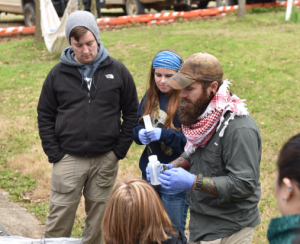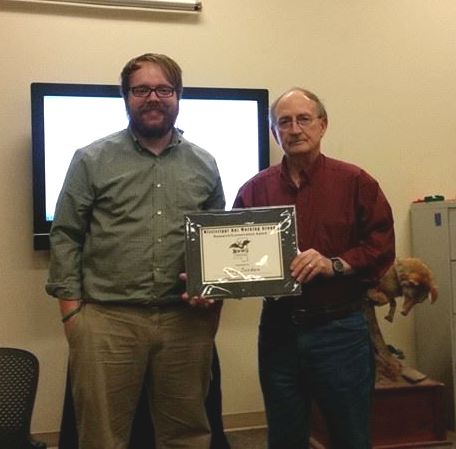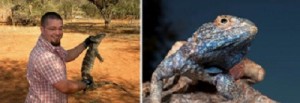 Congratulations! Biology Ph.D. student Tim Colston (right), a member of Dr. Brice Noonan’s laboratory group, has been awarded a Doctoral Dissertation Improvement Grant from the National Science Foundation. Tim will continue his studies of vertebrate community structure and whether bacterial communities living inside vertebrates might influence how new vertebrate species evolve. Tim will employ a novel approach to investigating these questions by exploring the evolutionary histories of both the bacteria found in the gut of reptiles and the evolutionary history of the reptile hosts. By utilizing cutting the edge technologies like next generation sequencing this project will allow Tim to understand the extent to which bacterial communities living inside vertebrates are structured by the ecology of the host (e.g. what the host eats, where they live) or the evolutionary histories of the host (e.g. how they are related to other species).
Congratulations! Biology Ph.D. student Tim Colston (right), a member of Dr. Brice Noonan’s laboratory group, has been awarded a Doctoral Dissertation Improvement Grant from the National Science Foundation. Tim will continue his studies of vertebrate community structure and whether bacterial communities living inside vertebrates might influence how new vertebrate species evolve. Tim will employ a novel approach to investigating these questions by exploring the evolutionary histories of both the bacteria found in the gut of reptiles and the evolutionary history of the reptile hosts. By utilizing cutting the edge technologies like next generation sequencing this project will allow Tim to understand the extent to which bacterial communities living inside vertebrates are structured by the ecology of the host (e.g. what the host eats, where they live) or the evolutionary histories of the host (e.g. how they are related to other species).
Archive for the ‘news’ Category
Biology Ph.D. student awarded a Doctoral Dissertation Improvement Grant
Sexy Dancers Have Bigger Brains: Day Lab research makes journal cover and editor’s pick
 Research by faculty member, Lainy Day, post-doctoral student Willow Lindsay and two undergraduate co-authors was recognized as the editor’s pick for this month’s issue of Brain, Behavior, and Evolution, http://www.karger.com/Article/FullText/369244 . Illustrations from the paper also made the cover of the journal. The editor’s pick is freely available for download in this journal that is normally available by subscription only. The paper demonstrates that when males are attracting females, the more complex the dance is the larger is the size of the male’s brain – at least in the family of birds known as the manakins, Pipridae. This group of birds lives in Central and South America and males perform courtship displays for females that vary in complexity from simple alterations in typical avian flight patterns to wildly acrobatic displays punctuated by loud snapping sounds made by the wings of the birds.
Research by faculty member, Lainy Day, post-doctoral student Willow Lindsay and two undergraduate co-authors was recognized as the editor’s pick for this month’s issue of Brain, Behavior, and Evolution, http://www.karger.com/Article/FullText/369244 . Illustrations from the paper also made the cover of the journal. The editor’s pick is freely available for download in this journal that is normally available by subscription only. The paper demonstrates that when males are attracting females, the more complex the dance is the larger is the size of the male’s brain – at least in the family of birds known as the manakins, Pipridae. This group of birds lives in Central and South America and males perform courtship displays for females that vary in complexity from simple alterations in typical avian flight patterns to wildly acrobatic displays punctuated by loud snapping sounds made by the wings of the birds.
Biology Graduate Student Cody Jordan Receives ‘Research/Conservation Award’
 Biology graduate student, Cody Jordan, received the ‘Research/Conservation Award’ at the 2015 Mississippi Bat Working Group annual meeting. He was nominated for and received this award for work done as part of his thesis research with assistance from the MBWG. Cody’s Master of Science thesis research, supervised by Dr. Richard Buchholz, is focused on Rafinesque’s big-eared bats (Corynorhinus rafinesquii), an uncommon species. The colony at his study site is the only known colony of this species in Lafayette county. His research has yielded new information on population size and structure, roost characteristics, and foraging behavior. This information will be used for conservation and management decisions regarding the roost because it is located in a rapidly deteriorating building.
Biology graduate student, Cody Jordan, received the ‘Research/Conservation Award’ at the 2015 Mississippi Bat Working Group annual meeting. He was nominated for and received this award for work done as part of his thesis research with assistance from the MBWG. Cody’s Master of Science thesis research, supervised by Dr. Richard Buchholz, is focused on Rafinesque’s big-eared bats (Corynorhinus rafinesquii), an uncommon species. The colony at his study site is the only known colony of this species in Lafayette county. His research has yielded new information on population size and structure, roost characteristics, and foraging behavior. This information will be used for conservation and management decisions regarding the roost because it is located in a rapidly deteriorating building.
VIDEO: Science Friday Is ‘Hot’ For Turkey Research
 The popular national show Science Friday highlights the research of Richard Buchholz, associate professor of biology, for clues as to what a female turkey finds “hot” in a male.
The popular national show Science Friday highlights the research of Richard Buchholz, associate professor of biology, for clues as to what a female turkey finds “hot” in a male.
With its fanned plumage and bold strut, a male wild turkey’s display conjures images of Americana and festive feasts. But this bird’s grandstanding isn’t intended for human eyes—it’s for female turkeys who actually use it to discern a male’s genetic prowess. How exactly she parses performances to pick a suitor can be a fairly complex enterprise.
Watch the Science Friday VIDEO>>
Doctoral Dissertation Improvement Grant Award Winner

Stuart Nielsen and Agama lizard
Congratulations! Biology Ph.D. student Stuart Nielsen (right), a member of Dr. Brice Noonan’s laboratory group, has been awarded a Doctoral Dissertation Improvement Grant from the National Science Foundation. This award will allow Stuart to continue his work on the evolution of lizards of southern Africa, including the Agama lizards (far right). His rigorous analyses of mechanisms thought to be driving diversification will greatly enhance our understanding of this unique and complex region.
Anonymous donor funds The Edmund Keiser Faculty Support Endowment
The endowment, which honors emeritus biology professor Dr. Edmund Keiser (a Department of Biology professor from 1976-2005), will provide research support for biology faculty during summer months when they are not supported by university salary. To read more or learn how to contribute to the endowment, click here.
Research Highlights: Dr. Glenn Parsons
Glenn Parsons, professor of biology and director of the UM Center for Biodiversity and Conservation Research, has invented a device that reduces unwanted fish and other creatures caught during the commercial fishing process – also known as bycatch – and thereby significantly increases the amount of shrimp caught. Read more
Research Highlights: Drs. Colin Jackson and Ryan Garrick
Congratulations to Drs. Colin Jackson and Ryan Garrick for their NSF award to study genetic, phylogenetic, and microbiome diversity in freshwater mussels.
The holobiont concept proposes that the functional organism is the sum of the interactions between a host and its microbiome (i.e., the consortium of microorganisms associated with the host). Department of Biology faculty members Colin Jackson and Ryan Garrick are studying these host-microbiome interactions as part of a recent National Science Foundation award to determine the processes that generate and maintain phylogenetic, genetic, and functional diversity of the freshwater mussel holobiont across multiple geographic scales. Freshwater mussels are a highly imperiled, diverse group of animals that play critical roles in rivers through their filter-feeding activities, and contribute to cycling of nutrients. Although the ecological value of freshwater mussels is widely appreciated, little is known about how factors like the genetic diversity within individual mussel populations, species diversity within mussel communities, or interactions between mussels and their gut microbiomes influence the ecological services they provide, across different environments. Similarly, little is known about how host-microbiome interactions have structured the evolution of both components of the holobiont over time. Dr. Jackson and Garrick’s research, in collaboration with researchers at the University of Alabama, will address these questions. The award, funded through NSF’s Dimensions of Biodiversity program, brings almost $800,000 to the Department of Biology and includes funding for graduate students and a postdoctoral scientist to work with Drs. Jackson and Garrick on the project.
To read the full article click the link below.
https://news.olemiss.edu/biology-professors-receive-nsf-award-study-biodiversity/
Research Highlights: Zanethia Barnett
Congratulations to PhD student Zanethia Barnett!
The U.S. Forest Service (USFS) and other federal land managers are responsible for maintaining the productivity of aquatic–riparian ecosystems, the associated native biota, and the ecosystem services they provide.
In this article, Zanethia Barnett, University of Mississippi Biology Department PhD candidate and USFS Natural Resource Specialist, along with a team of USFS scientist describe how disturbance and portfolio concepts fit into a broader strategy of conserving ecosystem integrity and dynamism and provide examples of how these concepts can be used to address a wide range of management concerns.
To see the article copy and paste–> https://biology.olemiss.edu/wp-content/uploads/sites/101/2018/10/Penaluna_et_al-2018-Fisheries-Zanethia-Barnett.pdf
